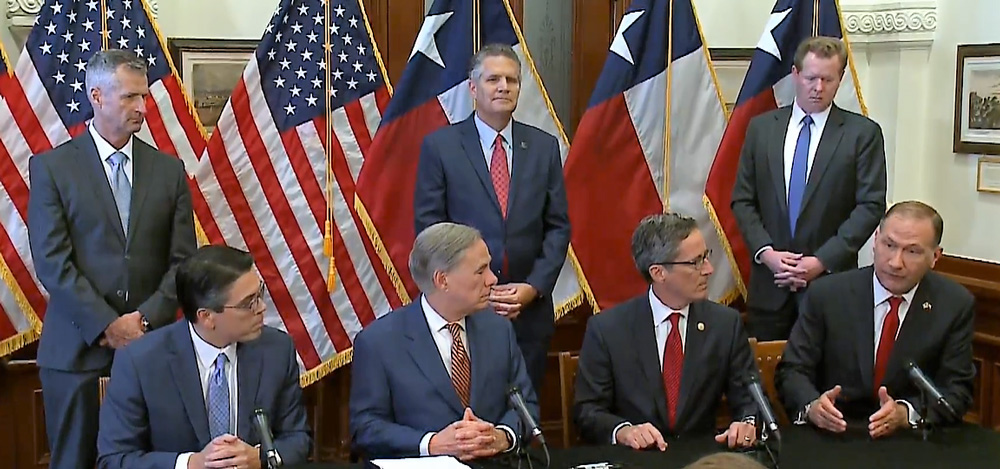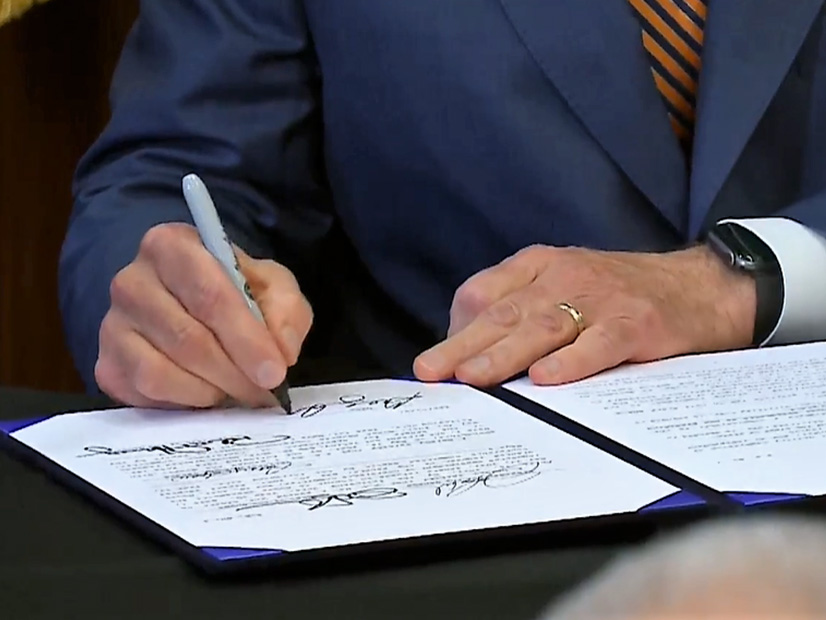Texas Gov. Greg Abbott signed into law Tuesday a pair of bills that he said would fix the “flaws” that led to February’s power failure, when a severe winter storm froze out half of ERCOT’s available generation and led to power outages that lasted for more than four days.
“A top priority we had this legislative session was to fix the power grid to prevent any other power grid failures in the future,” Abbott said during a televised bill signing ceremony in Austin. “The bottom line is that everything that needed to be done was done to fix the power grid in Texas.”
The legislation, Senate Bill 2 and SB3, require weatherization of power plants and some natural gas facilities, create a statewide emergency alert system, overhaul ERCOT and the Public Utility Commission, and bail out some market participants facing massive bills from the storm. (See Texas Legislators Finish Work on Electricity Market — for Now.)
The extreme weather left almost 5 million customers without power for almost 100 hours, led to hundreds of deaths and billions of dollars in damages, and bankrupted several market participants when prices were stuck at their $9,000/MWh cap for days.
“There’s no one sitting or standing here who does not remember that week, none of us,” Sen. Kelly Hancock (R), who carried SB3 to the finish line, said. “We don’t want people to go through that again. That’s why we passed reforms, to fix that, to make sure it will never happen again. We’re not immune to the pain and hurt of the people of Texas.”
Hancock joined Abbott for the bill signing. Also on hand were fellow lawmakers Sen. Charles Schwertner (R) and Rep. Chris Paddie (R). ERCOT Interim CEO Brad Jones, PUC Chair Peter Lake and Williamson County Judge Bill Gravell stood behind the politicians but did not have any remarks.

ERCOT issued a statement thanking Abbott and all state leaders for passing legislation “that will improve overall grid reliability for Texans.”
“We have already implemented a number of new operational and communications measures in preparation for summer and will continue coordinating with the [PUC] on implementing the grid enhancements that were signed into law today,” the grid operator said.
SB2 reduces the ERCOT Board of Directors from 16 members — comprised of directors unaffiliated with the ERCOT market and others selected by their market segments — to 11 members. Most of those will be picked by a political committee, with the selections approved by Abbott and other leaders.
Hancock called the measure a “total reform” of ERCOT. He said that while the board had been composed of industry experts, legislators found “conflicts of interest” during investigatory hearings.
“We blew it up,” Hancock said. “The board has a completely independent goal, whose entire focus is ensuring ERCOT remains strong and reliable. [ERCOT] is committed, we are committed to ensure … the lights stay on and there can be confidence now in the system we have in the great state of Texas.”
Energy experts have criticized the legislation for being too kind to the natural gas industry and have said that it leaves oversight to regulators cozy with the industry. The weatherization mandates do include fines for up to $1 million a day per violation but are not required until after next winter.
Paddie, who led the bills’ passage through the House, pushed back against comments that the legislation took it easy on the gas industry.
“I wish you would go tell them that because they’ve been whining in my office,” Paddie told reporters. “That is not what they’re saying.”
ERCOT Improving Summer Preparedness
Jones and Lake broke from ERCOT’s regularly scheduled virtual board meeting to attend the ceremony at the Capitol, where they shared the same summer preparedness presentation Jones had given to the directors.
ERCOT has added a number of new operational activities and initiatives based on lessons learned from February. They include performing on-site checks to verify weatherization plans, adding a short-term solar forecast with better data to address solar ramps with dispatched generation and reviewing load shed procedures and timing during emergency conditions.
Jones said the grid operator has created an advisory board comprised of officers from 15 regions of the Texas Municipal League. The group is expected to meet at least twice a year with ERCOT in an effort to improve communications and emergency preparedness.
“This allows us to meet with large- and small-town mayors and explain who ERCOT is,” Jones told the board. “It gives them the ability to communicate better with their residents.”
The advisory board will meet for the first time later this month. The Texas Municipal League has almost 1,200 member cities and involves more than 16,000 mayors, city managers and other city officials.
The grid operator and the PUC have already hosted a virtual pre-summer communications meeting with market participants and performed a biannual test of ERCOT’s emergency notification system. ERCOT is also strengthening its coordination and alignment with the PUC and Texas Division of Emergency Management. (See ERCOT, PUC Deal with ‘Trauma’ of February Storm.)




